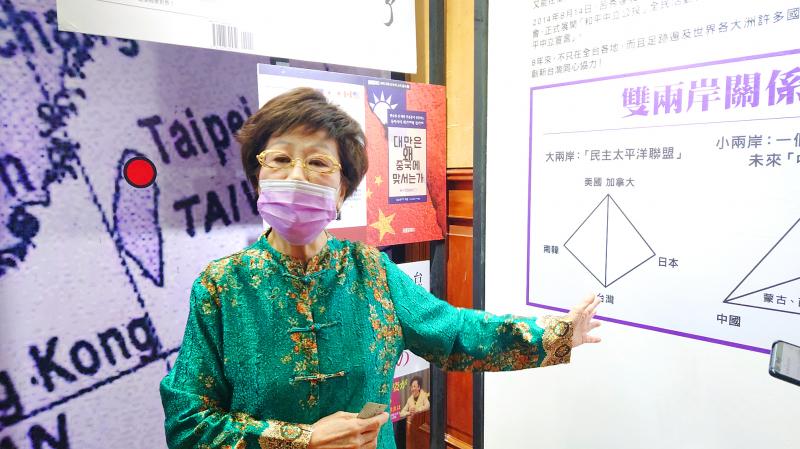Former vice president Annette Lu (呂秀蓮) yesterday promoted “cross-strait integration” (兩岸統合) as a model for keeping peace between Taiwan and China, while announcing that she would be organizing activities to promote her ideas.
A series of national affairs forums is being planned to encourage public discussion about her political integration model, she said, addressing a gathering at the “Her-Story, 50 Years for New Women” special exhibition at Tainan’s Wu Family Garden.
Attending the event was former president Chen Shui-bian (陳水扁), whose family is from Tainan.

Photo: Hung Jui-chin, Taipei Times
Lu said that “cross-strait integration” should replace “cross-strait unification” (兩岸統一), while calling on Beijing to take up the “one Zhonghua” (一個中華) concept, instead of “one China” (一個中國) idea.
Zhonghua means “Chinese.”
It is difficult to promote “unification,” as very few people in Taiwan would accept it, while integration can be discussed as it is broader in scope, Lu said.
The nations could then move toward forming a “Zhonghua confederation” (中華邦聯), which would encourage closer political and economic ties across the Strait, she said.
Lu has advocated the confederation model over the past few years.
She said her idea is based on the formation of the EU, or regional blocs such as ASEAN and the Community of Latin American and Caribbean States.
“In facing the threat of war, the Taiwanese government must push its soft power... I am presenting these ideas because Taiwan’s ruling and opposition parties have not provided any new policies for cross-strait relations,” Lu said. “Our young people are lost, with no clear direction.”
To advocate her political ideas, Lu has is planning a rally dubbed “Peace and Love for Taiwan,” co-organized with several major religious organizations.
Lu’s idea is to promote peace in light of Russia’s invasion of Ukraine. The rally was scheduled for May 14, but due to the COVID-19 outbreak has been postponed to Aug. 14, she said.
Democratic Progressive Party (DPP) members in the audience were conspicuous in their lack of support for Lu’s ideas.
Chen said: “I will not talk about this today,” while other politicians also declined to comment.
Political experts have said that Lu has drifted from the DPP, and most party members and supporters disagree with most of her ideas.
Forming a confederation with China would mean giving up Taiwan’s sovereignty and democratic way of life, they said.
Professor Chang Cheng-shuh (張正修), a former political strategist for the DPP and a former Examination Yuan member, said that most DPP supporters see Lu as using her controversial concepts to get closer to the pro-China political camps.
“Most people now view Lu as a former politician who has outdated ideas, and has no popular support, so she has taken up more far-out positions to ... gain public attention and media coverage,” Chang said. “Lu is trying to stay relevant ... but she is out of touch with the current generation.”

Taiwanese can file complaints with the Tourism Administration to report travel agencies if their activities caused termination of a person’s citizenship, Mainland Affairs Council Minister Chiu Chui-cheng (邱垂正) said yesterday, after a podcaster highlighted a case in which a person’s citizenship was canceled for receiving a single-use Chinese passport to enter Russia. The council is aware of incidents in which people who signed up through Chinese travel agencies for tours of Russia were told they could obtain Russian visas and fast-track border clearance, Chiu told reporters on the sidelines of an event in Taipei. However, the travel agencies actually applied

Japanese footwear brand Onitsuka Tiger today issued a public apology and said it has suspended an employee amid allegations that the staff member discriminated against a Vietnamese customer at its Taipei 101 store. Posting on the social media platform Threads yesterday, a user said that an employee at the store said that “those shoes are very expensive” when her friend, who is a migrant worker from Vietnam, asked for assistance. The employee then ignored her until she asked again, to which she replied: "We don't have a size 37." The post had amassed nearly 26,000 likes and 916 comments as of this

New measures aimed at making Taiwan more attractive to foreign professionals came into effect this month, the National Development Council said yesterday. Among the changes, international students at Taiwanese universities would be able to work in Taiwan without a work permit in the two years after they graduate, explainer materials provided by the council said. In addition, foreign nationals who graduated from one of the world’s top 200 universities within the past five years can also apply for a two-year open work permit. Previously, those graduates would have needed to apply for a work permit using point-based criteria or have a Taiwanese company

The Shilin District Prosecutors’ Office yesterday indicted two Taiwanese and issued a wanted notice for Pete Liu (劉作虎), founder of Shenzhen-based smartphone manufacturer OnePlus Technology Co (萬普拉斯科技), for allegedly contravening the Act Governing Relations Between the People of the Taiwan Area and the Mainland Area (臺灣地區與大陸地區人民關係條例) by poaching 70 engineers in Taiwan. Liu allegedly traveled to Taiwan at the end of 2014 and met with a Taiwanese man surnamed Lin (林) to discuss establishing a mobile software research and development (R&D) team in Taiwan, prosecutors said. Without approval from the government, Lin, following Liu’s instructions, recruited more than 70 software